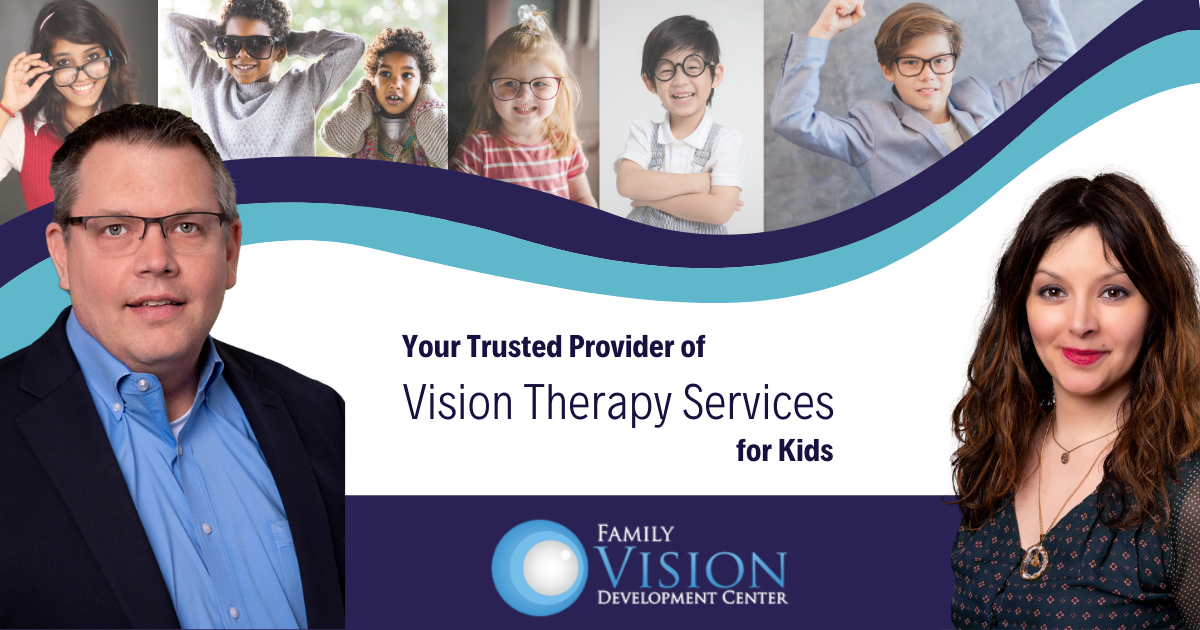Most parents understand the importance of protecting their child’s vision. After all, success in school, in sports and in life in general are all tied to healthy vision. So when a parent notices that their child is experiencing issues with their vision, they want to know the best options available to treat the problem. Glasses or contacts are possible solutions for some disorders, but not all. Vision therapy is an extremely effective form of treatment for a wide range of vision conditions, and kids can truly benefit from the process. Here is some important information to get you started, so you can discover if vision therapy might be the right choice for your child.
What is Vision Therapy?
Vision therapy is a kind of physical therapy for the visual system, which includes the eyes and the brain. This therapy uses specialized eye exercises to help patients develop or recover normal visual skills. Completing this vision training can help kids (or adults) improve their vision so they are better able to perform daily tasks like reading, writing, driving, athletic participation and much more.
What is Involved in a Vision Therapy Program?
Creating a custom-tailored program for your child starts with a comprehensive vision exam. Once a vision disorder has been appropriately diagnosed, a vision therapy plan is developed to meet the specific needs of your child. A majority of the therapy is completed right in our office, with some at-home exercises designed to support our in-person sessions. Appointments are simple and comfortable for kids, usually lasting 30-45 minutes and involving short activities or games to complete the eye exercises.
What Disorders can Vision Therapy Help Treat?
We have seen remarkable success when using vision therapy as a treatment in the following situations:
- Binocular vision impairments – which occur when the eyes do not work together as a team. This can result in disorders such as amblyopia (lazy eye), strabismus (crossed eyes), esotropia (eye turns inward), exotropia (eye turns outward) or hyperphoria (eye turns upward)
- Focusing issues – keeping objects in focus when looking from one object to another
- Eye tracking issues – inability to smoothly follow an object from one place to another
- Visual processing problems – when the brain does not correctly interpret visual information
- Visual impairments sustained due to post-concussive vision syndrome or a traumatic brain injury
- Visual issues caused by certain genetic conditions present in some special needs individuals
- Computer vision syndrome – caused by excessive digital screen exposure
Vision Therapy is our Specialty
At Family Vision Development Center our specialty is providing custom, personalized vision therapy programs to meet the needs of our patients. Our highly-qualified doctors have completed advanced training so you can feel confident that your child is receiving the best possible care. Dr. Martin is an optometrist & vision rehabilitation specialist with special training in vision therapy and vision development, who is also pursuing a fellowship from the Neuro-Optometric Vision Rehabilitation Association. Dr. Santoyo-Johnson is also an optometrist and vision rehabilitation specialist, and is the only provider in the area who is a Board Certified Fellow in light therapy by the College of Syntonic Optometry.
We look forward to working with your family and providing the best treatment options for your child in order to restore their vision to the fullest extent possible. Contact our office at 630-862-2020 to learn more and to schedule your appointment.
Additional information can be referenced here

